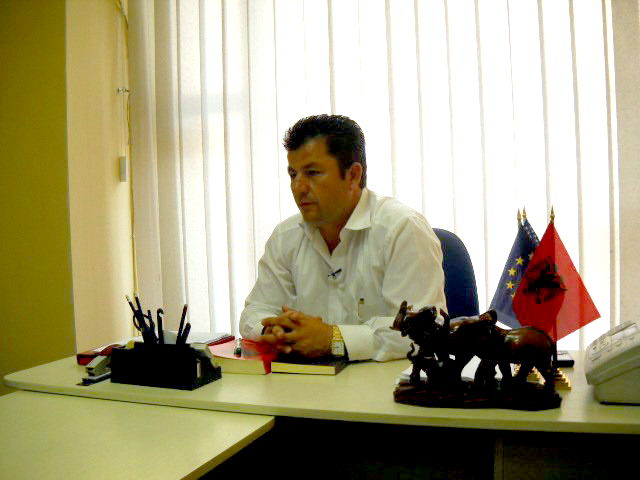




Agim Loci works to help his countrymen observe a time-honored code for resolving disputes – but without violence.
The girl’s two brothers thwarted the attack at the last moment. But the matter did not stop there: The family wanted revenge. But Mr. Loci made a highly unusual decision: He took his friend, tied him up, and made him stand in a field before the girl’s entire family.
“I said, ‘If you want to kill him, kill him. But then his family will come and kill one of you,’ ” Loci recalls. “Of course, nobody was going to kill him then.”
Loci now works as a bodyguard for the Albanian Ministry of Justice. But he regards that day 14 years ago as the beginning of an unlikely second career as a volunteer peacemaker.
In addition to his ministry job, Loci is one of the leading coordinators for the Committee for Nationwide Reconciliation (CNR), a nongovernmental organization that works to broker truces between families caught in the murderous cycles of blood feuds, a custom rooted in the tradition of an “eye for an eye” and sanctioned by a centuries-old Albanian code of conduct. Feuds and revenge killings have resurfaced significantly since this Balkan country’s transition from communism to democracy and are sometimes spark by issues as basic as property disputes.
World Vision, a Christian humanitarian organization that monitors Albania, says that more than 5,000 have been killed in blood feuds since 1992.
Some 1,600 Albanian families cannot leave their homes today because they are involved in blood feuds, CNR estimates. Human rights organizations note in particular the impact blood feuds are having on the country’s children: more than 1,000 cannot attend school because of them.
Shuttle Diplomacy
Loci is a squat and powerful man, with the snout of a pistol peeking from beneath his shirttail – standard equipment for his bodyguard work. Several times a week, he works out of this gritty suburb of ad hoc markets and choking traffic 30 minutes outside Tirana, the capital. From a modest office, he coordinates CNR volunteers throughout greater Tirana, where as many as 114 families are thought to be living in hiding because of blood feuds – 40 in this town alone.
Families contact Loci with requests that he mediate their feuds. The first step, though, is often to visit the family seeking revenge and inform them that the other family wants forgiveness.
What follows is a sort of grass-roots shuttle diplomacy, with Loci bringing messages back and forth and keeping the family in hiding updated on where their avengers stand. Often, reconciliation comes with a price tag – compensation paid to the family wanting revenge. Loci helps negotiate that sum.
It can be dangerous work. In 2004, a CNR volunteer was murdered in northern Albania. Still, Loci has reconciled more than a dozen feuds in recent years. A gift from families following peace is his only payment. But he says he’s setting an example for his three children.
“I want to give my children what my father gave me: a good name,” he says. “I want my children to have the respect for life my father gave me.”
Ancient Tradition Still holds Sway
Blood feuds may seem like an anachronism in a country that was invited to join NATO this spring and is positioning itself to make an official bid, potentially this year, for European Union membership.
But in Albania, the forces of tradition and modernity exert equal pull. Often, Loci must respect an honored code of conduct while fighting how it is applied today.
That code, or Kanun in Albanian, dates to the 15th century and has long served as a blueprint for social conduct, governing everything from how to treat strangers and arrange marriages to how to pay taxes and settle property disputes.
And, yes, it lays out a brutal tenet: Blood must be paid for with blood.
Strict rules always have governed that precept, namely, that only the killer could be targeted in a blood feud. As applied today, however, the family members of the killer, including women and children, are also targeted, says Ismet Elezi, a law professor at Tirana University.
The result: Whole families confined to their homes, the one place a murder cannot be avenged under Kanun.